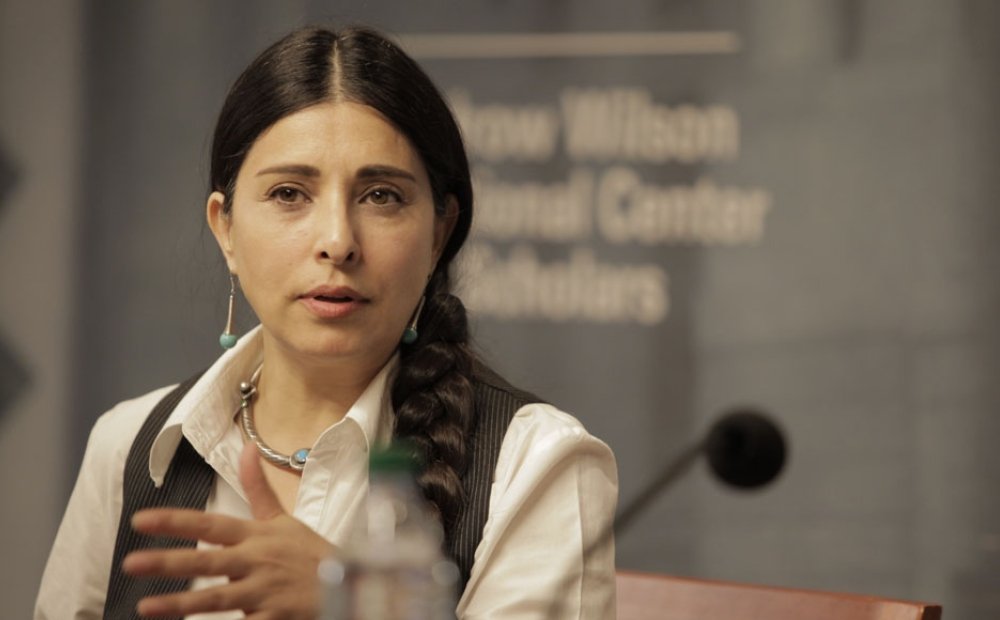When America Leaves: Protecting Women and Girls in Afghanistan through Education

Hassina Sherjan, Founder and CEO of Aid Afghanistan for Education and owner and CEO of Boumi Company, discussed her efforts and priorities in dealing with educating Afghans.
On October 19, the Middle East Program, Asia Program, and the Global Women’s Leadership Initiative hosted a meeting, “When America Leaves: Protecting Women and Girls in Afghanistan through Education” with Sherjan. Haleh Esfandiari, Director of the Middle East Program at the Wilson Center, moderated the event.
Sherjan opened by discussing the background of the Aid Afghanistan for Education (AAE) program and the personal experiences that led to its founding. Having come to the United States after the Soviet invasion of Afghanistan, Sherjan returned to Afghan refugee camps in Peshawar in 1995. Noting “how we take things for granted” in the United States, she discussed how the women she encountered were “starved for knowledge” and the responsibility she felt for “those we left behind.” Feeling that lack of adequate education in Afghanistan was the reason why the Afghan government got to where it was in the late 1990s, Sherjan argued that more needed to be done to expand access to education beyond the big cities and into remote villages. One issue faced by educators in Afghanistan is that of older students trying to enroll in lower grades, where many feel embarrassed; government-run schools do not even allow people aged ten or older to enroll without prior education. Sherjan, saying that aid groups have to look at local needs, discussed how AAE created an accelerated education program for older students, which has graduated 834 students since 2007 when they obtained government permission to issue Afghan high school diplomas.
Sherjan discussed the plans of AAE to expand operations to more provinces, especially in the South, where often “there are no schools for girls or boys.” Saying that a focus on women’s education alone is not enough, she argued that greater education for boys can help combat the influence of the Taliban and reduce gender prejudice in Afghan society. She pointed to AAE’s current enrollment of 3000 girls and 104 boys as a sign of a growing focus on educational access for all marginalized Afghans. Sherjan felt that “parents are very eager to send all of their children to school,” and in many cases husbands encourage their wives to seek further education. She discussed several cases where children’s enrollment in primary education encouraged their parents to return to school as well, in order to be able to help their children with homework and maintain respect within the household.
Sherjan pointed out that “programs and projects have to be sustainable for the long term,” and it is important not only to expand school capacity but maintain donor and local commitment to educational programs. Currently, most educational NGOs “are not based on needs, they’re based on what we think is best” for Afghans; Sherjan advocated building a deeper “people-to-people connection” with Afghans to find out what their specific educational needs are. Saying, “We already ignored Afghanistan once,” she felt that educational priorities are fundamental to building a stable country. Though acknowledging that Afghanistan is working its way through a difficult process and Afghans and donors have “a lot of work to do,” Sherjan felt optimistic about the long term. She stressed that to succeed “Afghans have to step up and take ownership” of domestic programs rather than relying on foreign advisors. Although Afghans “will always need our international allies to be there for us when we need help,” they need to have room to assume leadership in the “learning process” towards democracy.
By Laura Rostad, Middle East Program
Speaker
Hosted By

Middle East Program
The Wilson Center’s Middle East Program serves as a crucial resource for the policymaking community and beyond, providing analyses and research that helps inform US foreign policymaking, stimulates public debate, and expands knowledge about issues in the wider Middle East and North Africa (MENA) region. Read more


Indo-Pacific Program
The Indo-Pacific Program promotes policy debate and intellectual discussions on US interests in the Asia-Pacific as well as political, economic, security, and social issues relating to the world’s most populous and economically dynamic region. Read more


Global Women's Leadership Initiative
The Global Women’s Leadership Initiative has hosted the Women in Public Service Project at the Wilson Center since June, 2012. The Women in Public Service Project will accelerate global progress towards women’s equal participation in policy and political leadership to create more dynamic and inclusive institutions that leverage the full potential of the world’s population to change the way global solutions are forged. Read more
